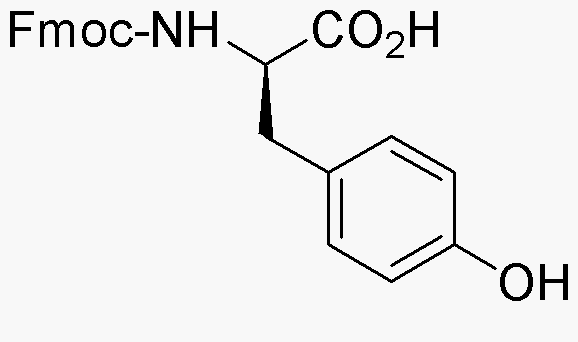Fmoc-D-tyrosine is widely utilized in research focused on:
- Peptide Synthesis: This compound serves as a key building block in solid-phase peptide synthesis, allowing researchers to create complex peptides efficiently.
- Drug Development: Its role in modifying peptide structures makes it valuable in the pharmaceutical industry for developing new drugs with enhanced efficacy and stability.
- Bioconjugation: Fmoc-D-tyrosine can be used to attach biomolecules to surfaces or other molecules, which is crucial in creating targeted drug delivery systems.
- Research in Neuroscience: Due to its structural similarity to neurotransmitters, it is often used in studies related to brain function and neuropharmacology.
- Protein Engineering: This compound aids in the design of proteins with specific functions, which is essential in biotechnology and synthetic biology applications.
Informations générales
Propriétés
Sécurité et réglementation
Applications
Fmoc-D-tyrosine is widely utilized in research focused on:
- Peptide Synthesis: This compound serves as a key building block in solid-phase peptide synthesis, allowing researchers to create complex peptides efficiently.
- Drug Development: Its role in modifying peptide structures makes it valuable in the pharmaceutical industry for developing new drugs with enhanced efficacy and stability.
- Bioconjugation: Fmoc-D-tyrosine can be used to attach biomolecules to surfaces or other molecules, which is crucial in creating targeted drug delivery systems.
- Research in Neuroscience: Due to its structural similarity to neurotransmitters, it is often used in studies related to brain function and neuropharmacology.
- Protein Engineering: This compound aids in the design of proteins with specific functions, which is essential in biotechnology and synthetic biology applications.
Documents
Fiches de données de sécurité (FDS)
La FDS fournit des informations de sécurité complètes sur la manipulation, le stockage et l’élimination du produit.
Spécifications du produit (PS)
Le PS fournit une description complète des propriétés du produit, notamment sa composition chimique, son état physique, sa pureté et les exigences de stockage. Il détaille également les plages de qualité acceptables et les applications prévues du produit.
Certificats d'analyse (COA)
Recherchez des certificats d'analyse (COA) en saisissant le numéro de lot du produit. Les numéros de lot et de lot se trouvent sur l'étiquette d'un produit, après les mots « Lot » ou « Lot de fabrication ».
Numéro de catalogue
Numéro de lot/série
Certificats d'origine (COO)
Ce certificat d'exploitation confirme le pays dans lequel le produit a été fabriqué, et détaille également les matériaux et composants utilisés et s'il est issu de sources naturelles, synthétiques ou autres sources spécifiques. Ce certificat peut être requis pour les douanes, le commerce et la conformité réglementaire.
Numéro de catalogue
Numéro de lot/série
Fiches de données de sécurité (FDS)
La FDS fournit des informations de sécurité complètes sur la manipulation, le stockage et l’élimination du produit.
DownloadSpécifications du produit (PS)
Le PS fournit une description complète des propriétés du produit, notamment sa composition chimique, son état physique, sa pureté et les exigences de stockage. Il détaille également les plages de qualité acceptables et les applications prévues du produit.
DownloadCertificats d'analyse (COA)
Recherchez des certificats d'analyse (COA) en saisissant le numéro de lot du produit. Les numéros de lot et de lot se trouvent sur l'étiquette d'un produit, après les mots « Lot » ou « Lot de fabrication ».
Numéro de catalogue
Numéro de lot/série
Certificats d'origine (COO)
Ce certificat d'exploitation confirme le pays dans lequel le produit a été fabriqué, et détaille également les matériaux et composants utilisés et s'il est issu de sources naturelles, synthétiques ou autres sources spécifiques. Ce certificat peut être requis pour les douanes, le commerce et la conformité réglementaire.


